The ultimate guide to book recs for every Enneagram type
(especially for literary fiction lovers)
You know that mug that says “Introverted but willing to discuss books?” That’s me, but you could replace books with Enneagram types. Combine them, and I could talk for hours. There are surprisingly few (and not very robust) recommendation lists like this, so here’s my take. Don’t know your Enneagram type? Try any of the free quizzes floating around, but also make sure you read the type descriptions on the Enneagram Institute website. When you come across the description that feels like staring into the depths of your own soul: that’s your type.
This is not to say that you will only enjoy books that correspond to your own Enneagram type - some of my favorite books are ones I’ve categorized as type 2 or type 5 or type 7. But it’s a fun exercise to try to capture the vibes of these books as Enneagram types, whether it’s due to the themes they address or due to protagonists who exude a certain kind of energy.
If you’re an IG friend, you’ve gotten a sneak peek already, but here’s the extended version with little blurbs about my top picks in each category. I hope you find some good ones to add to your list!
Enneagram 1 books feature protagonists who advocate for a better world or take a principled stand, even when it costs them.
There’s the Korean American college activist in Ryan Lee Wong’s Which Side Are You On who wants to drop out of school to work on Black Lives Matter full time, the young gay Black man in Rasheed Newson’s My Government Means to Kill Me who forsakes his inheritance to become an HIV/AIDS activist in NYC, and the medical student in V.V. Ganeshananthan’s Brotherless Night whose conscience is torn by the Sri Lankan civil war.
The titular night watchman in Louise Erdrich’s Pulitzer Prize-winning The Night Watchman travels to D.C. to advocate for his tribe; a 20th high school reunion forces the protagonist of Alejandro Varela’s National Book Award finalist The Town of Babylon to confront the societal and public health ills of Latino immigrant life in the suburbs; and the unforgettable daughter of Palestinian refugees in Susan Abulhawa’s Against the Loveless World must decide how to respond to Israeli occupation.
Enneagram 2 books are all about caregiving, the ways we look out for one another and extend care.
While the depiction of opioid addiction and misogyny in Tiffany McDaniel’s On the Savage Side can be brutal, the friendship amongst the young women offers sparks of light and hope. Oscar Hokeah’s Calling for a Blanket Dance is a moving portrayal of how intergenerational love - not just trauma - can be passed down. The way the sister in Marie Myung-Ok Lee’s Hurt You cares for her neurodivergent brother with deep and fierce love, the help a Greek girl extends to a washed-up refugee in Omar El Akkad’s What Strange Paradise, the environmental caretaking in Diane Wilson’s The Seed Keeper, the tender affection among the characters in Barbara Kingsolver’s Animal Dreams - all of these radiate Enneagram 2 vibes to me.
Enneagram 3 books are about striving and ambition.
The main character of Rachel Heng’s sweeping history of Singapore, The Great Reclamation, must decide between political career advancement and a childhood love. The Jeremy Lin-like NBA player and his K-drama producer girlfriend in Matthew Salesses’ The Sense of Wonder are at the top of their game, but still face racism and sexism. The pioneering female aviator in Maggie Shipstead’s Booker Prize finalist Great Circle won’t let any obstacle stand in the way of her goals. And the status-conscious wedding planner in Xochitl Gonzalez’s fun novel, Olga Dies Dreaming, has to decide whether her approach to love is really working.
Enneagram 4 books are all about unique characters who channel creativity and moodiness in equal measures.
The painter in Audrey Magee’s Booker Prize-longlisted The Colony is obsessed with capturing the light and the water just right, not caring who he might hurt along the way. Blandine, the protagonist of Tess Gunty’s National Book Award winning The Rabbit Hutch, is a modern mystic à la Hildegarde of Bingen and intelligent beyond her years. The teenage swimmer in Jade Song’s Chlorine tries to turn into a literal mermaid (cw: body horror). A classic younger sister, Jayne’s life in NYC is falling apart in Mary H.K. Choi’s Yolk - but can she be there for her older sister when she’s most needed?
Enneagram 5 books are cerebral and introspective.
Benjamín Labatut’s The Maniac and When We Cease to Understand the World are both fictional, literary explorations of the history of science that reveal that science isn’t neutral and that technological advancement isn’t always good for the world. Weike Wang’s quirky humor in Chemistry as well as Joan is Okay captures emotionally stunted Chinese American female protagonists whose science-propelled careers may or may not be the right fit for them. The neuroscience PhD candidate in Yaa Gyasi’s Transcendent Kingdom wrestles with both faith and science (you should just read everything Gyasi writes, she’s impeccable). Some of the most beautiful writing I’ve ever read is to be found in Hernan Diaz’s In the Distance, with his isolated protagonist in the American West. And Kazuo Ishiguro’s Booker Prize winner The Remains of the Day is a poignant story of an English butler whose staidness may have cost him the most important thing in life.
Enneagram 6 books are steeped in loyalty and the bonds that create stability and safety.
Five strangers find refuge in an NGO compound in Sudan as war swirls around them in Fatin Abbas’ pitch-perfect Ghost Season. The multigenerational families in Honorée Fanonne Jeffers’ The Love Songs of W.E.B. DuBois and Kirstin Valdez Quade’s The Five Wounds have varying levels of dysfunction, but there’s an underlying connectedness that acts as a safety net in both novels. Sarah Thankam Mathews’ National Book Award finalist All This Could Be Different imagines the community of found family among a group of millenials trying to make it during the economic malaise of the late aughts. And both Claire Jiménez’s What Happened to Ruthy Ramirez and Pik-Shuen Fung’s Ghost Forest examine the fractures and endurance of immigrant families.
Enneagram 7 books are, above all, joyful. There’s an element of whimsy, delight, or pleasure in each of these picks.
Amor Towles’ A Gentleman in Moscow might be the most fun, heartwarming-but-not-saccharine, treat of a book I’ve ever read as it details a Russian count’s house arrest in the Metropol hotel, but Gabrielle Zevin’s Tomorrow, and Tomorrow, and Tomorrow would surely give it a run for its money in its tale of friendship and collaboration over the decades among two video game designers. Kathryn Ma’s The Chinese Groove is an uplifting, fresh take on the modern immigrant narrative, while Daniel Mason’s North Woods frolics across centuries to spin the captivating yarn of a rural Massachusetts house and its strange, varied inhabitants.
Enneagram 8 books are about power, dominance, and conflict.
R.F. Kuang’s searing fantasy The Poppy War reimagines China’s 20th century history, particularly in relation to Japan. The menopausal women in Kirsten Miller’s The Change harness magical powers to investigate the murders of teenage girls in their Long Island community - and take revenge. Rita Chang-Eppig’s Deep as the Sky, Red as the Sea might read like fantasy, but it’s based on the true tale of a Chinese pirate queen.
I’d never read an Asian American book that was so unapologetic until coming across Elaine Castillo’s blazing America is Not the Heart. Nana Kwame Adjei-Brenyah forces the reader to confront mass incarceration, racism, the prison-industrial complex, and violence in his National Book Award finalist Chain-Gang All-Stars. Naomi Alderman’s The Power has one of the most interesting premises of recent years: What happens if women suddenly become more physically powerful than men?
Enneagram 9 books exude a longing for peace and reconciliation.
Putsata Reang’s Ma and Me (memoir) and Neel Patel’s Tell Me How to Be (novel) both center around queer Asian immigrant children hoping for acceptance from their parents. In a similar vein, Fatima Farheen Mirza’s A Place For Us depicts the estranged son of an Indian American Muslim family and how he wrestles with religion, tradition, and autonomy.
Whether during the bloodbath of Partition in Melody Razak’s Moth, amidst the violence of Chicago’s high rise projects in Toya Wolfe’s Last Summer on State Street, or under the shadow of tensions between the Black and Korean communities in Steph Cha’s Your House Will Pay, these protagonists hope for and work towards the cessation of hostilities.
OK, I’m curious: What’s your Enneagram type and what do you love (or hate) about it? What are some books that you’d nominate for the categories above? And come at me: Do you agree or disagree with my picks? I want to hear your thoughts!





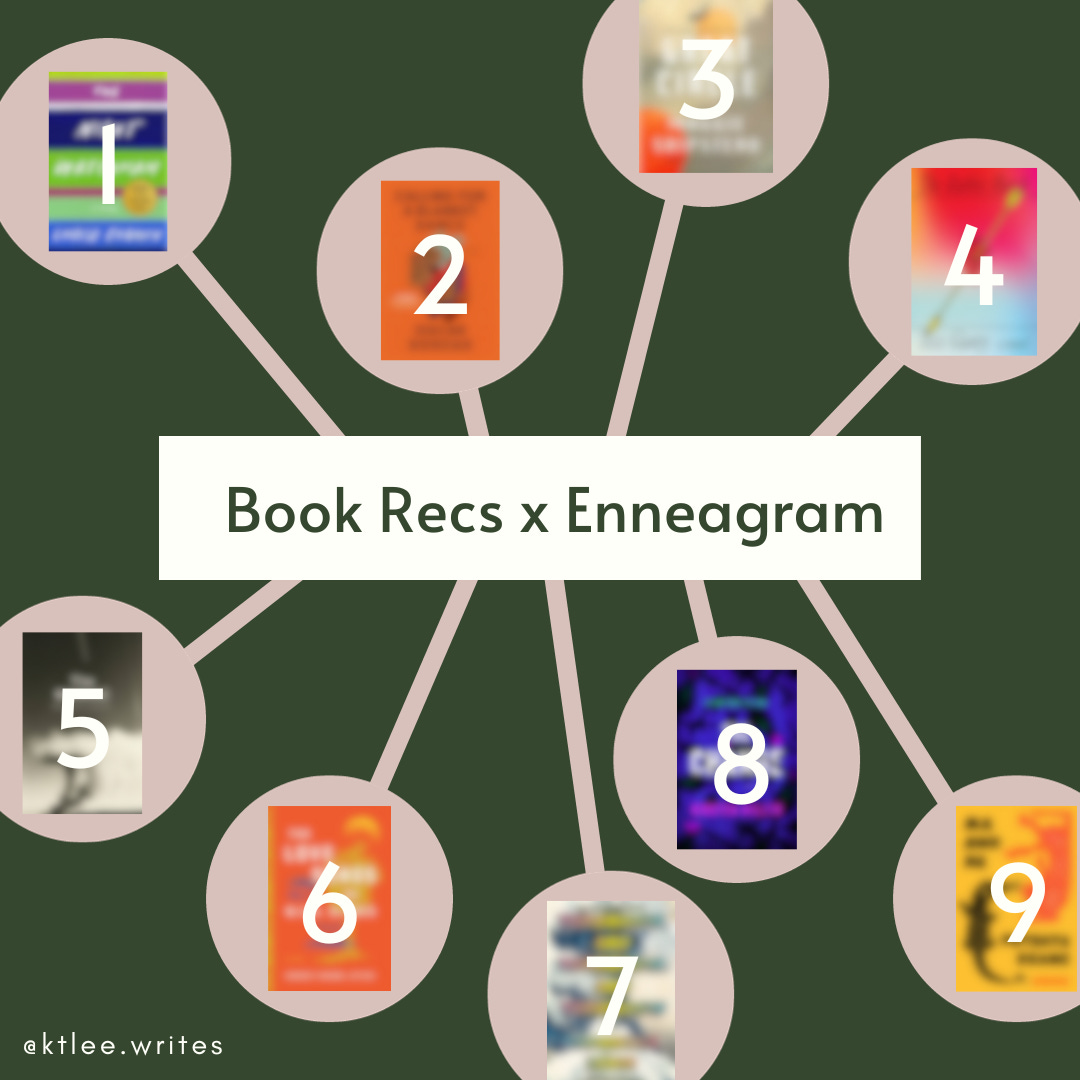
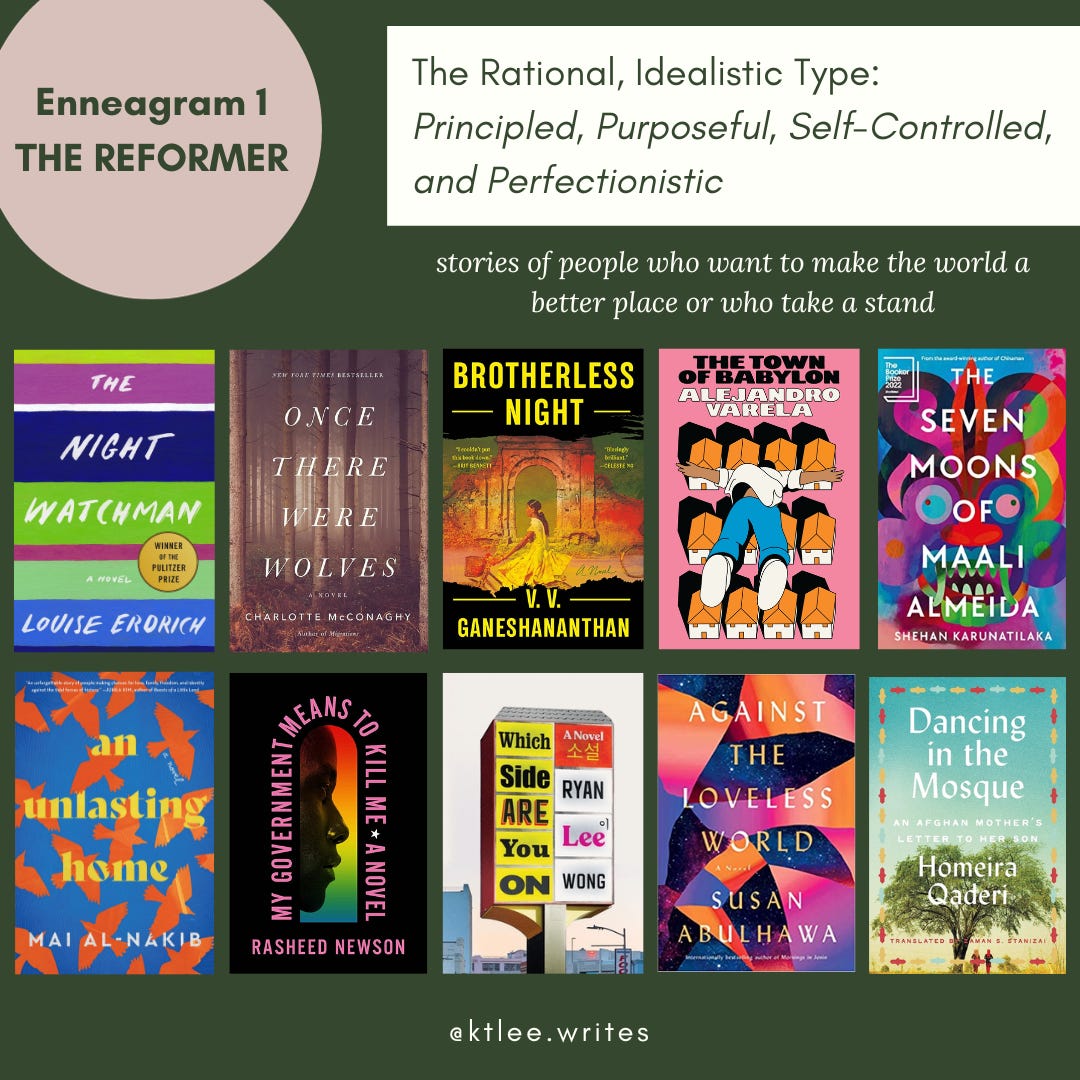
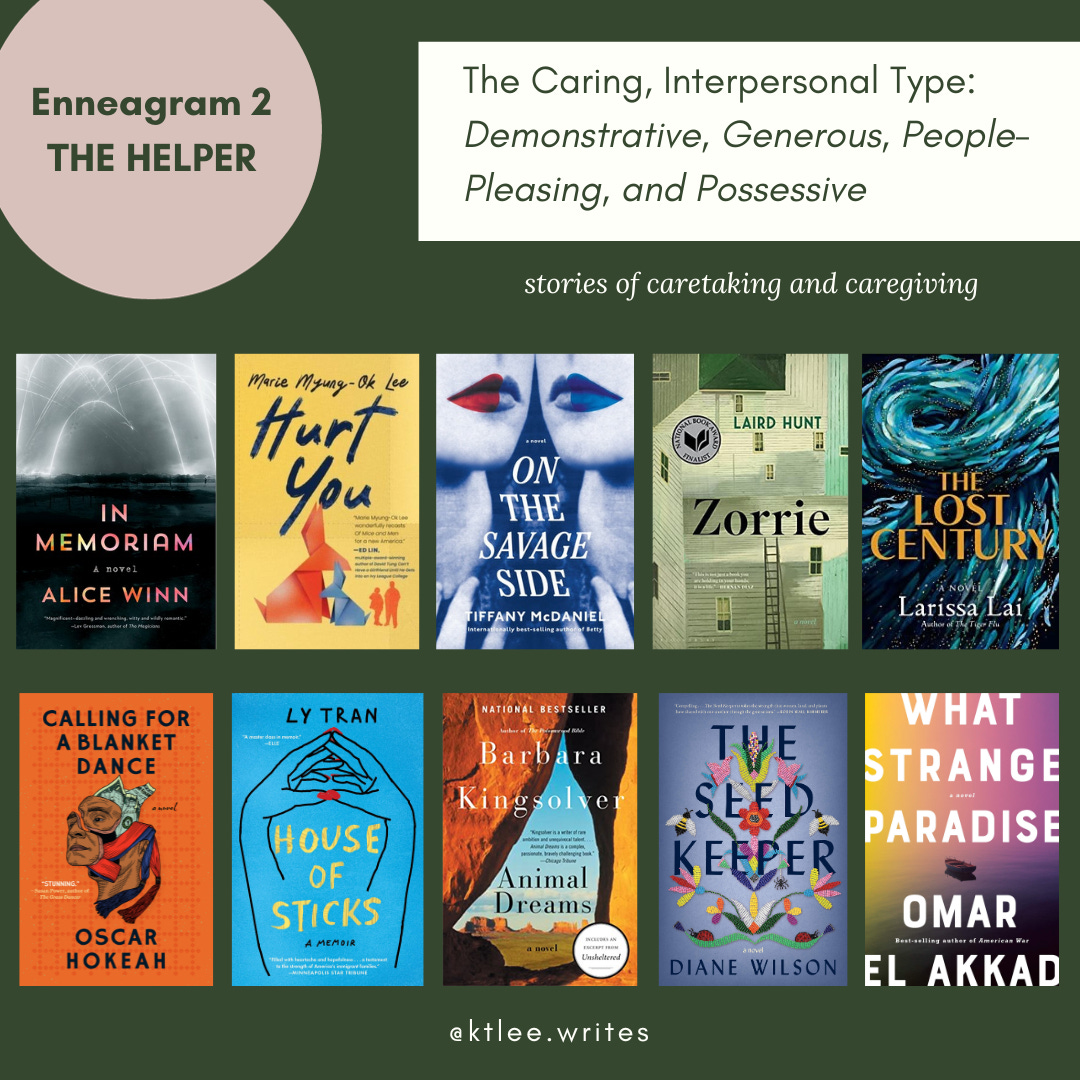
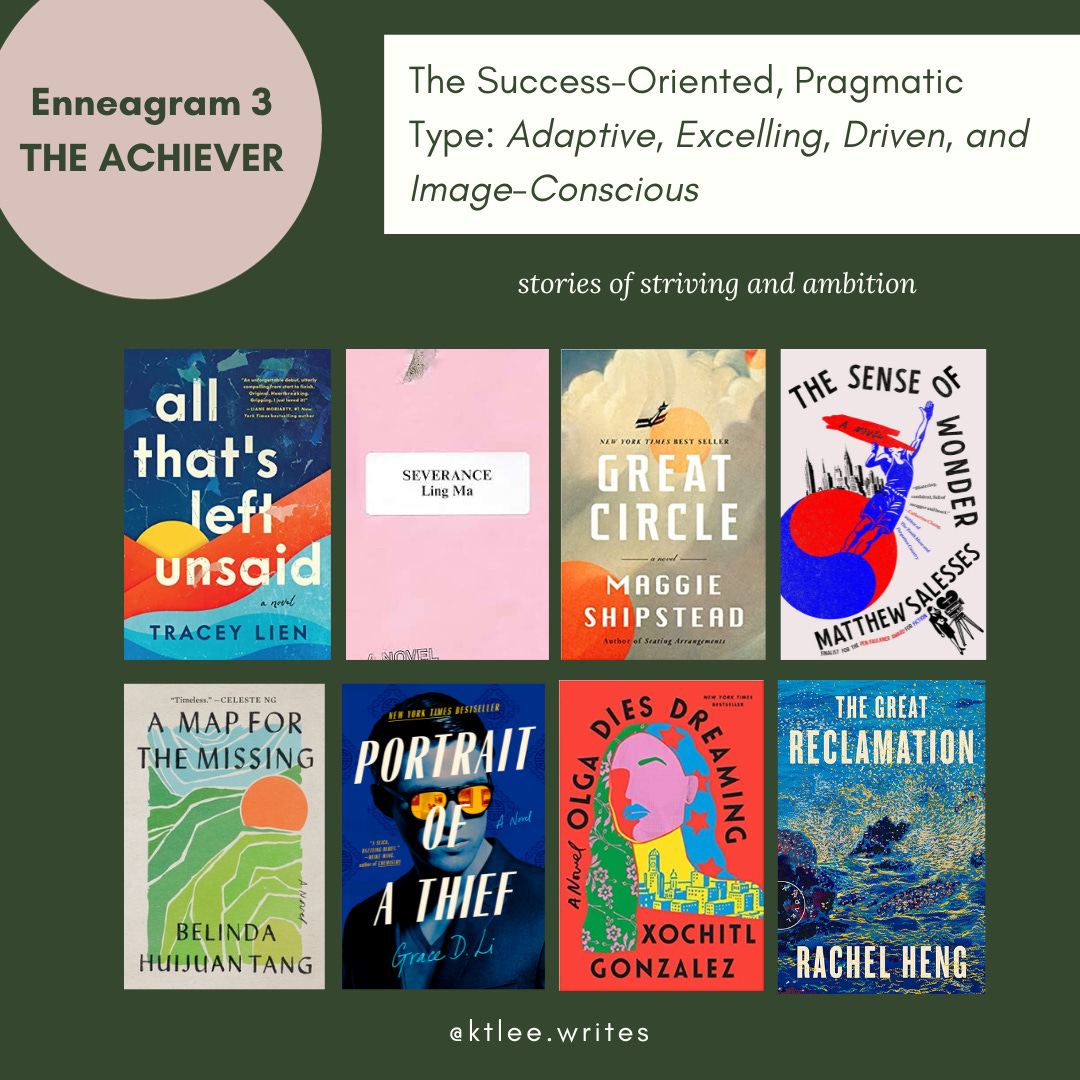
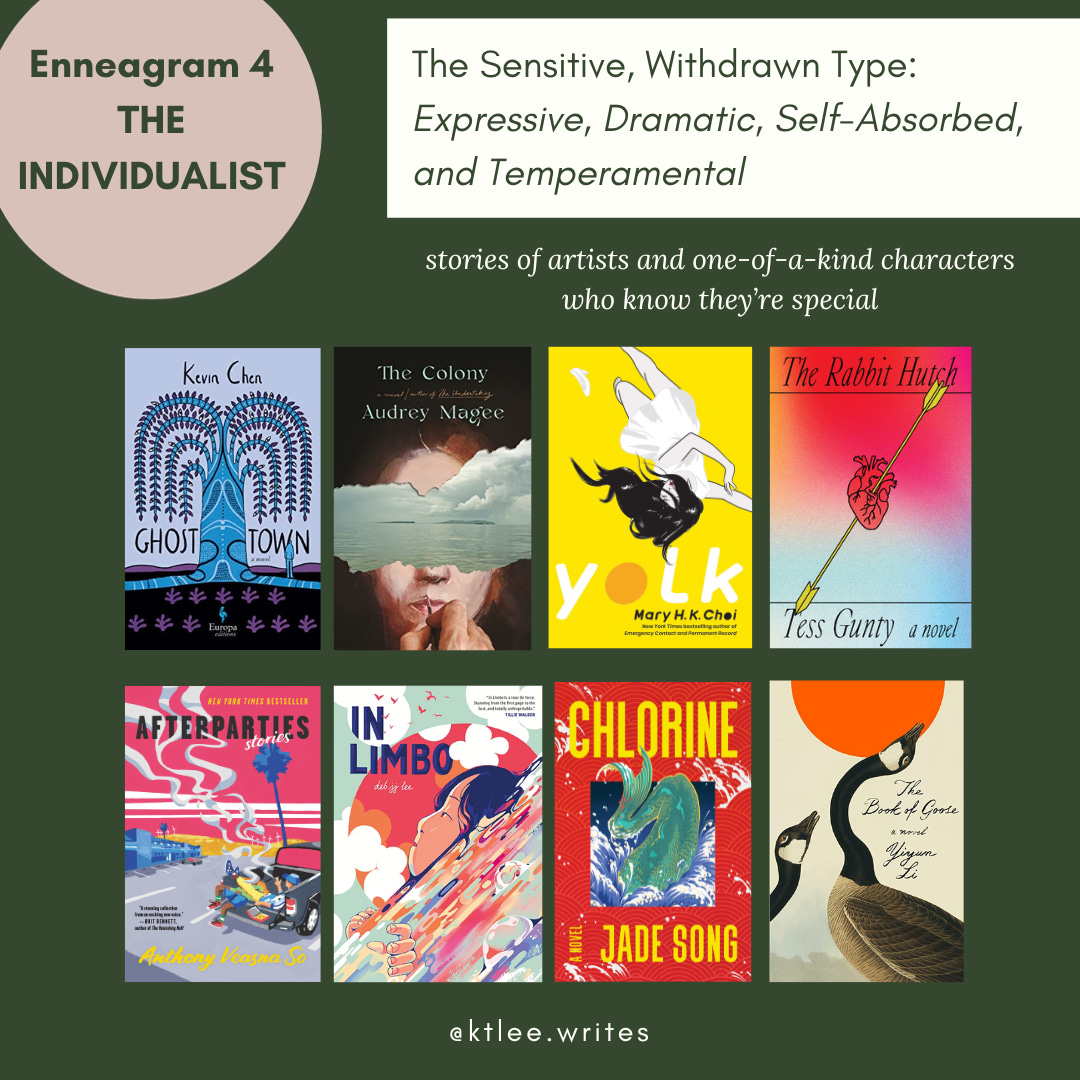
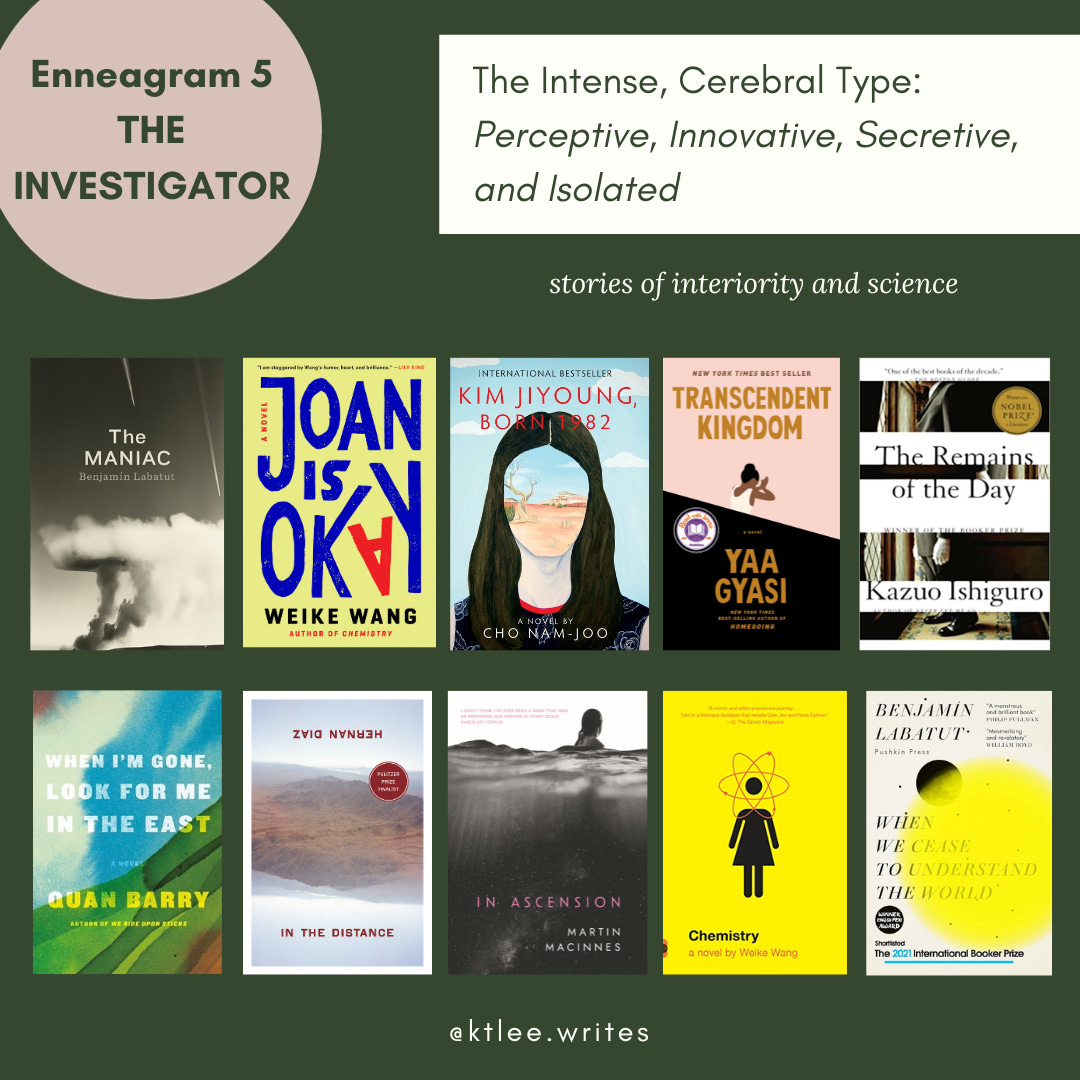
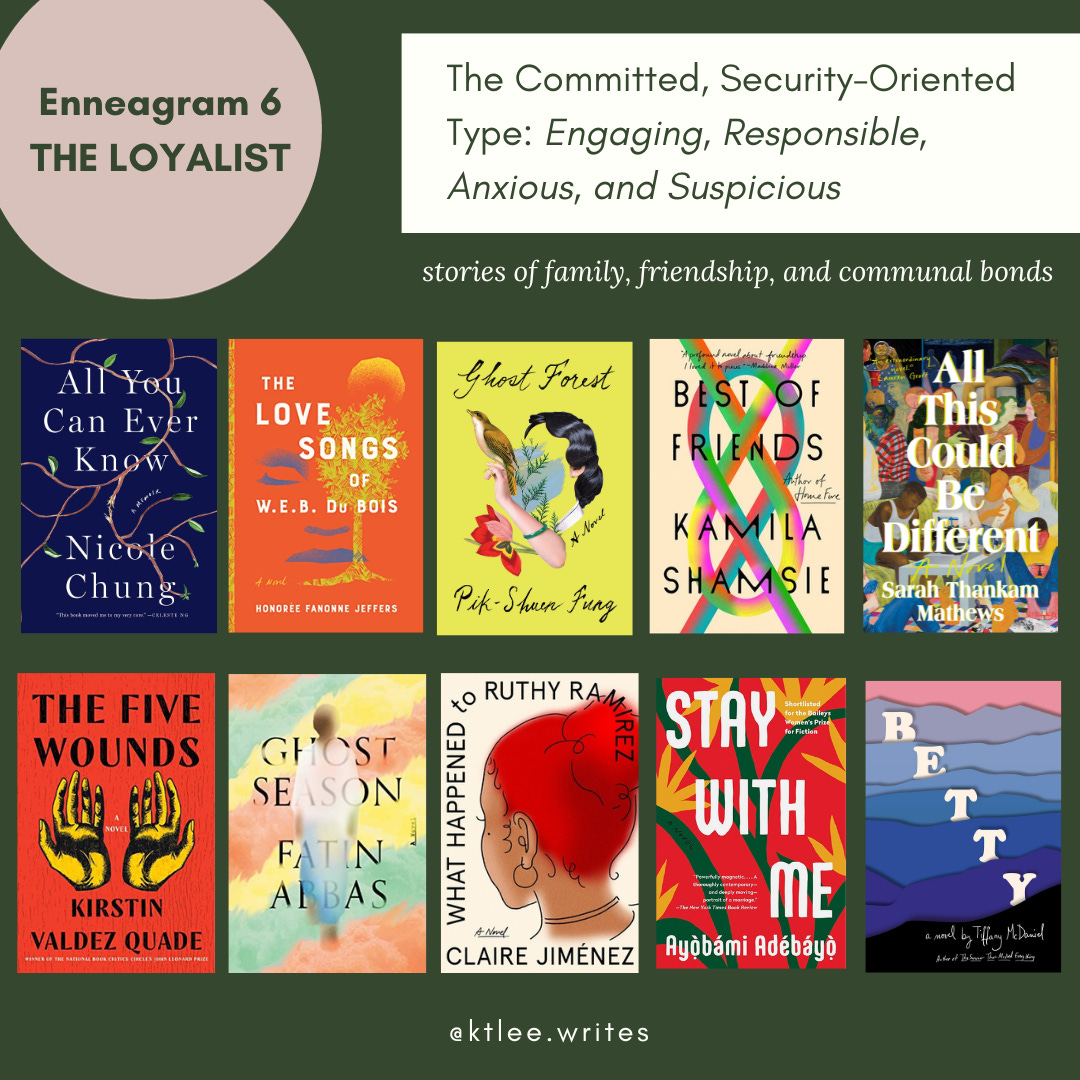
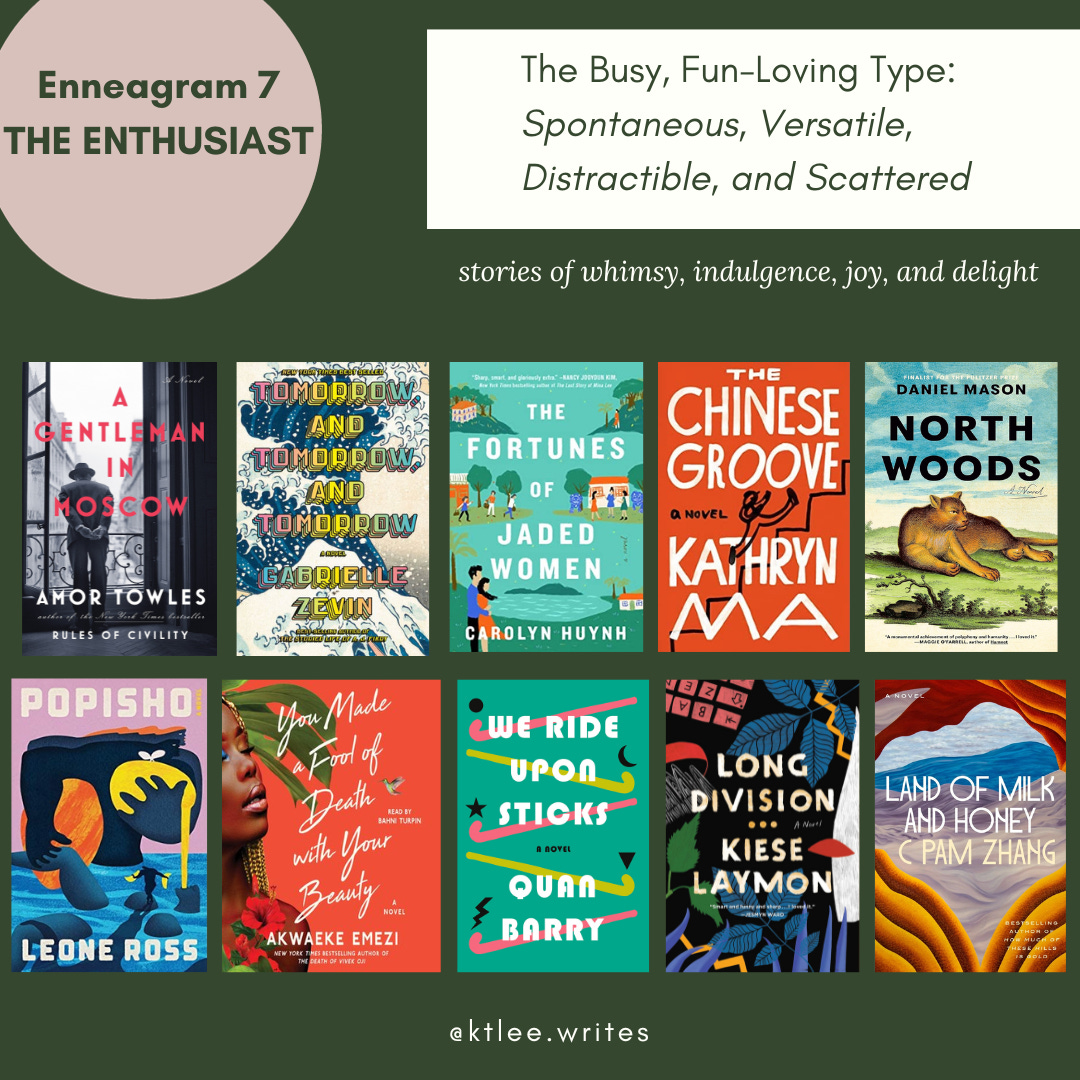
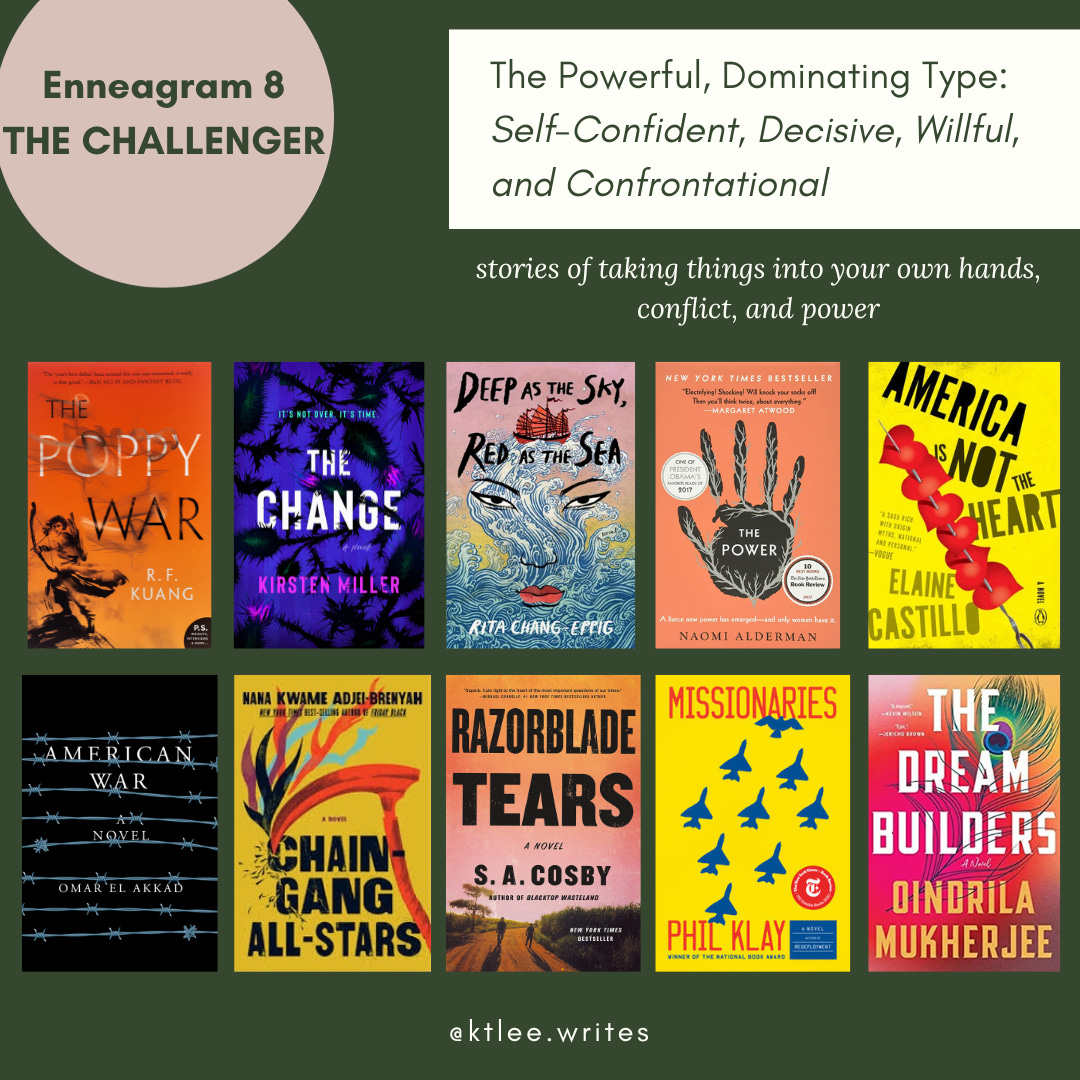
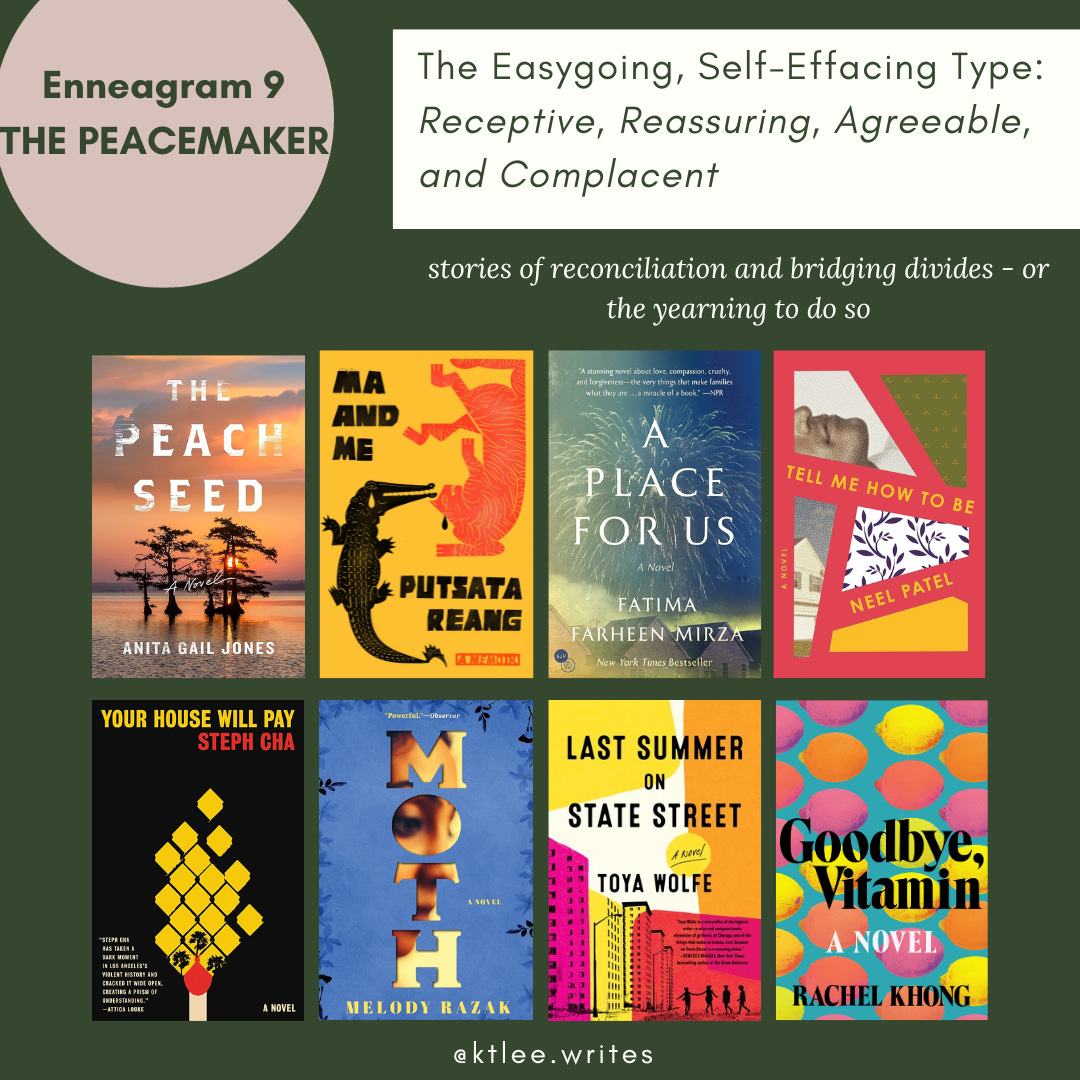
3w2 ✋🏽
This came at the perfect time! I was able to quickly scroll through and pick up 7 moons, severance and chemistry from the library while the kids played in the kids section! Excited! (Idk what enneagram type I am)